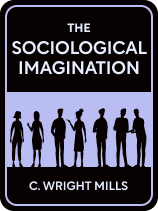

This article is an excerpt from the Shortform book guide to "The Sociological Imagination" by C. Wright Mills. Shortform has the world's best summaries and analyses of books you should be reading.
Like this article? Sign up for a free trial here .
What is “sociological imagination”? Is it a better approach to social science? How does it protect human freedom?
In The Sociological Imagination, professor and sociologist C. Wright Mills explains what kind of social science—that is, science that studies human society and its institutions—contributes to a free and open society. He argues that, to protect freedom, social scientists must develop a “sociological imagination”: the ability to understand the relationship between a society and the individuals living in it. Additionally, Mills critiques other contemporary approaches to social science and how they fail to protect—and in some cases, actively threaten—free society.
Here’s our overview of The Sociological Imagination by C. Wright Mills.
The Sociological Imagination
The Sociological Imagination by C. Wright Mills argues for a return to the ideals of “classic” social science typical of pioneering sociologists like Max Weber. Weber viewed sociology as the attempt to understand the values behind social interaction—in other words, trying to explain why people behave in certain ways. To achieve this goal, Weber wrote broad and extensive analyses of western societies. Extensive analysis allowed him to grasp the many factors involved in social decision making, while focusing on one society meant he could still study specific historical or empirical examples. Keep in mind this “classic” approach to sociology and how Mills encourages social scientists to re-adopt it.
Part 1: The Main Goal of Social Science
Mills argues that the main goal of social science must be the preservation of freedom. Mills defines freedom as the ability to understand, debate over, and decide between choices—particularly in a social and political context. Freedom, explains Mills, is the main mechanism for making social and political decisions.
The Main Threat to Freedom
In contemporary Western society, Mills argues, the main threat to freedom is complexity. In other words, societies and their institutions have become so complex that people don’t understand what they are, how they work, or why they matter.
Part 2: The Importance of Sociological Imagination
After explaining why social scientists must preserve freedom, Mills then discusses how their work can do so. He argues that to preserve freedom, social scientists use “sociological imagination” (recall: this is the ability to connect a society’s history to the personal lives of the people in it). This often means connecting personal problems in the lives of individuals to social problems that affect entire societies.
Example: A personal problem is that Joe’s marriage is falling apart. A social problem is that half of US marriages end in divorce. Sociological imagination helps a social scientist connect these two examples: They might look at Joe’s personal problems and see if many other American couples have the same challenges. Or, they might study the social problem of power dynamics in American marriages in a way that helps explain Joe’s collapsing marriage.
Shortform Commentary: Is Sociological Imagination Paradoxical?
One scholar argues that Mills’s conception of sociological imagination and his demand for political action is paradoxical. They suggest that it leads to a “self-reference” paradox, the most famous of which is, “This sentence is false”: It’s false, therefore it’s true, therefore it’s false, and so on. Mills’s critics suggest that his paradox consists of two main premises:
- Individuals are created by the society they live in.
- Individuals must participate politically to change their society.
Much like “This sentence is false,” these two premises create an endless loop:
Critics argue that Mills doesn’t provide a way out of this paradox other than the possibility of an enlightened leader who somehow exists outside of their society—which is either wishful thinking or anti-freedom.
How Sociological Imagination Preserves Freedom
By adopting a sociological imagination in their work, Mills says social scientists can preserve the three necessary components of freedom we discussed in Part 1:
- Understanding: Connecting personal and social problems allows individuals to contextualize their lives within their society—this context provides an understanding of large social problems.
- Debating: Recognizing society’s impact on their personal lives also motivates people to debate over potential solutions to social problems.
- Deciding: Then, through social or political participation, they can decide how to try and solve social problems.
Using a sociological imagination, therefore, prevents political apathy by empowering and motivating people to participate in their social and political systems.
(Shortform note: Mills’s views on social science and freedom are similar to the Marxist conception of “false consciousness”: the majority of a society failing to recognize the true social and political circumstances they live in. Mills seems to suggest that social science provides “true” understanding of societal circumstances to those who are politically oblivious or apathetic—seemingly dispelling a false consciousness. However, Mills’s reasons for dismantling “false consciousness” are different from those of Marxists. While Marxists argue that revealing social “truth” serves a specific goal—ending class domination and hierarchy—Mills says that people should decide on their own what to do with these social “truths.”)
Using a Sociological Imagination
To use a sociological imagination, Mills argues that social scientists must develop their own methods and create their own work from beginning to end. A social scientist using sociological imagination not only connects other individuals’ lives to society—they must also connect their own lives to the society they live in. In other words, they must understand how their society informs the work they do. This means that social scientists can’t use the methods of others without question or create a partial work for someone else to finish. Instead, they must determine the methods that best connect personal and social problems and adopt them in their own work.
By developing original methods, a social scientist can improve their work in three ways:
- Recognizing personal bias
- Understanding others’ perspectives
- Maintaining a broad scope
Part 3: Grand Theory
Now that we understand how sociological imagination preserves freedom, we can explore Mills’s critiques of other sociological approaches. He explains contemporary trends in social science and why they fail to preserve freedom. In Parts 3 and 4 of our guide, we’ll look at the two main approaches that he critiques: grand theory and abstracted empiricism.
Defining Grand Theory
Instead of studying contemporary or historical examples to learn about one society, grand theorists attempt to create rules and systems that explain the nature of all societies and their histories. Grand theorists would argue that, when created correctly, these systems can explain any society or historical event.
Flaws of Grand Theory
Mills argues that grand theory fails to preserve freedom—the main goal of social science. He outlines two main flaws that cause this failure: irrelevance and inaccessibility.
Irrelevance
By focusing entirely on abstract concepts rather than specific historical or societal examples, a grand theory approach is irrelevant to the lives of individuals.
Inaccessibility
A grand theory approach to social science defines concepts in such a detailed and academic way that it creates inaccessible work. Mills argues that this obsession with concepts leads to dense, complicated, and jargon-heavy works of social science that don’t make sense to all but the most dedicated academics. Unsurprisingly, inaccessible works fail to help individuals understand the relationship between their lives and their society—and therefore fail to preserve freedom.
Part 4: Abstracted Empiricism
Mills acknowledges that the negative impact of grand theory is relatively low compared to the main target of his criticism: an approach he calls “abstracted empiricism.” This approach doesn’t attempt to place social science work in the context of people’s lives or major social problems—Mills explains that this is what makes it “abstracted.” Instead, it focuses entirely on “empirical evidence”: data and observations gained primarily through methods like surveys, opinion polls, and interviews.
Abstract empiricists believe that social science based entirely on empirical evidence has two main benefits: provability and practicality.
Benefit #1: Provability
Using empirical evidence, an abstract empiricist can systematically observe, test, and measure a specific hypothesis. They believe that this high burden of proof ensures that they base their arguments on real, observable reality instead of theories or speculations.
Benefit #2: Practicality
Abstract empiricists argue that social science based entirely on empirical evidence is practical: It maintains a reasonable scope. They claim that any attempt to make a broad claim about society fails to recognize the enormous number of factors involved in large-scale societal problems. By using only empirical evidence, abstract empiricists focus on specific questions that they actually can answer. Abstract empiricists note that, while individual works of social science can’t determine larger social truths, accruing enough data over time will eventually allow social scientists to combine this data and definitively prove some larger social reality.
Flaws of Abstracted Empiricism
Mills explains that the flaws of abstracted empiricism are the two main assumptions built into the approach: the definitions of “provability” and “practicality.” He argues that these definitions are narrow and flawed to the point where abstracted empiricism can’t create social science that preserves freedom—and sometimes creates social science that harms freedom.
The Flaws of “Provability”
Mills explains that abstracted empiricism uses a definition of “provability” that doesn’t properly apply to the social sciences. Abstracted empiricism attempts to use the scientific method to “prove” a claim, measuring and observing to study a hypothesis to determine if it’s correct or incorrect. But the social sciences don’t just deal with correct and incorrect—they also study competing values and beliefs. In such a circumstance, there is no simple “correct” or “incorrect,” therefore, the scientific method doesn’t actually “prove” anything.
Mills explains that reliance on the scientific method means that abstracted empiricism can find out what is true but not why it’s true.
The Flaws of “Practicality”
Mills argues that abstracted empiricism uses a definition of practicality that’s biased toward circumstances specific to abstract empiricist research. This bias means that the abstract empiricist’s definition of practicality isn’t an objective standard for judging social science—it’s just a judgment of what’s better for them.
Abstracted Empiricism and Threats to Freedom
These flawed conceptions of provability and practicality contribute to Mills’s main criticism of abstracted empiricism: Not only does it fail to preserve freedom (his stated goal of social science), it actively threatens a free society.
Fails to Preserve Freedom
Abstracted empiricism fails to meet all three standards of Mill’s definition of freedom:
1) Understand: Abstracted empiricism can’t help individuals understand the connection between their lives and major social problems. Its methods can’t answer why one impacts the other, and can’t take a wide enough scope to study larger social problems.
2) Debate: Abstracted empiricism doesn’t invite further debate on social problems—it can’t suggest why these problems occur, or why a potential solution might fix them.
3) Decide: People who don’t understand major social problems or how to debate them will tend toward political apathy rather than social or political action.
Actively Threatens Freedom
Mills argues that abstracted empiricism doesn’t just fail to preserve freedom—it actively threatens freedom by creating non-ideological and amoral social scientists that work on behalf of powerful political, military, and economic institutions. Abstracted empiricism doesn’t train social scientists to examine the impact that such institutions have on people’s lives. Doing so is beyond the scope of their methods—abstracted empiricism cannot ask why. This means that abstract empiricists won’t recognize if their research benefits an institution that is unethical or actively challenges freedom. They create social science that doesn’t take a moral or ideological stand in favor of a free society—to them, it’s just a job.
Exercise: Practice Sociological Imagination
Consider your own society and life experience to practice using sociological imagination.
- Describe a personal problem in your life that you think might connect to a larger social problem. (Example: You might have student loan debt.)
- Look up the problem you described on the internet. Does it seem common? What are some common causes people suggest? (Example: At graduation, 54.6% of US students will have some student loan debt. Experts suggest that some of the causes are harsh loan practices, the rapidly rising cost of college in the US, and growing income inequality.)
- Briefly read about the history of your problem. Is it recent? How has it changed over time? (Example: US student loan debt has tripled in the past 10 years.)
- Based on your previous answers, how does your personal problem relate to larger social problems? How could you address the social problems it connects to? (Example: You might recognize how your personal financial challenges relate to the terms of your student loans. Some people try to address this problem by arguing for student loan forgiveness—others argue for a reevaluation of how necessary college education is or for schools to teach greater financial literacy and debt management skills.)

———End of Preview———
Like what you just read? Read the rest of the world's best book summary and analysis of C. Wright Mills's "The Sociological Imagination" at Shortform .
Here's what you'll find in our full The Sociological Imagination summary :
- C. Wright Mills's theory of how social science can preserve freedom
- What grand theory is and how it's flawed
- How social science based entirely on empirical evidence harms freedom






